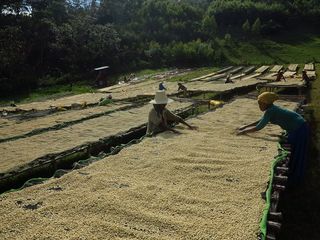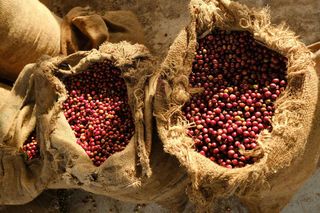April 2019
April 2019: Six months of feature roasters and insight.
April was our second feature from the Oromia region of Ethiopia, this time featuring Limu Hunda Oli, a washed process coffee from Altura coffee. Once again it was humbling to be able to connect back to previous features and build upon knowledge of this region, its coffee and the lives of the people who live here.Click here to view our first feature.
During April our story explored:
Hunda Oli Station:
Originally part of one of the largest co-ops in the country, OCFCU (Oromia Coffee Farmers Co-operative Union), the Hunda Oli station was built with the technical assistance of TechnoServes coffee initiative in 2012.
In 2016 the co-op split and Keta Muduga Co-op union was formed with a number of top specialty producers in the region.
The co-op consists of 128 members who have an average land area of 1ha.
Annual production at Hunda Oli is 66,000kg of green bean, processed from 395,000kg of red cherry.
Located at an altitude of over 2000m above sea level, Hunda Oli can produce washed process coffees with the benefit of having spring water gravity fed to water tanks and a wet mill with a mechanical demucilager capable of processing1500kg per hour.
Drying of parchment is achieved with 54 raised African beds,each measuring 15m x 1.60m. That’s just shy of 1300m2 of drying capacity or 1.3 times the average co-op members entire land holding.
Processing at Hunda Oli:
Co-op members pick carefully selected fully ripe cherries, before delivering them to the co-op’s wet mill.
Once received at the wet mill, the red cherries are floated in tanks filled with water to separate the floaters.
Once the defects are removed, the next grading step is to remove over ripe and green cherries, this is done by hand at the cherry sorting table.
From here the good cherries are sent for pulping.
Hunda Oli use a mechanical demucilager, therefore eliminating the need for fermentation.
Following pulping, the parchment was soaked in tanks for 6 hours to remove any remaining mucilage.
Drying takes place on 1.10m high tables constructed of wire mesh, the parchment remains covered during over head sun and at night.
The drying of parchment takes 10-13 days and receives regular turning, every 15 minutes to allow even drying.
Processing (General):
Irrespective of the care taken, or the harvest method used, green (under ripe), under developed and over ripe cherries, along with sticks and leaves can en d up inamong the ripe cherries.
The first step in grading cherries when they reach the washing station is flotation.
Note: This is “best practice” but not always possible due to a lack of infrastructure and fresh water.
Ripe cherries and green cherries sink due to their density, while sticks, leaves and defective cherries float, allowing for them to be easily skimmed off and separated.
Floaters will often be sent immediately for drying as they are set aside for local consumption while the ripe cherries (sinkers) are sent for further processing (and grading).
In the case of washed process such as our Ethiopia Limu Hunda oli, they are sent for pulping to remove the bean(s) from the cherry.
Tasting Notes:
Country: Ethiopia
Coffee: Ethiopia Limu Hunda
Region: Oromia
District: Goma
Sub District: Beshasha
Soil Type: Red Soil
Temperature: 26c
Process: Washed
M.A.S.L: 2038m
Rainfall : Above 2000mm (annual)
Flavour: Cherry, Peach, Fig Dried fruits and florals.
Body: Juicy
To enjoy the full story of our next release, jump over to Subscriptions to secure your place and be sure to check out our Gift Boxes too.
|
© Copyright Derelict Coffee Roasters |



